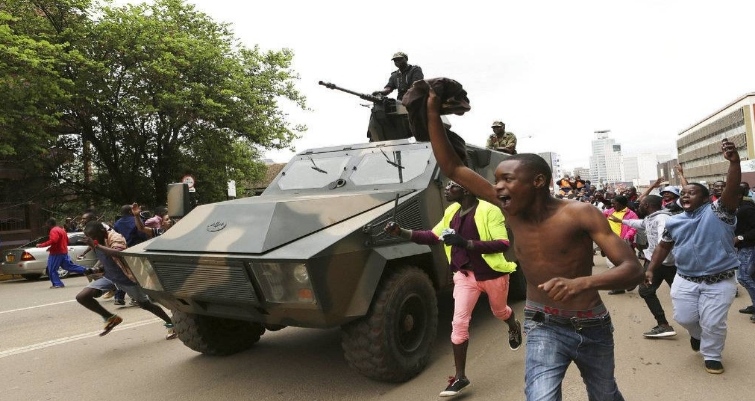Overview of recent military coups in various African countries
Various countries across Africa have experienced more than 90 coups d’etat since 1952

Military on the streets of Harare, Zimbabwe
On the morning of August 30, 2023, a group of high-ranking officers of the Gabonese armed forces appeared on national television to announce that they had taken power and annulled the results of the August 26 elections, in which incumbent President Ali Bongo Ondimba, who had held office since 2009, was re-elected for a third term. Altogether, various countries across Africa have experienced more than 90 coups d’etat since 1952. coups that have occurred on the continent since 2017 are reviewed below.
Zimbabwe
On November 15, 2017, in Zimbabwe the military placed President Robert Mugabe, who had headed the country for 37 years since it gained independence in 1980 (as prime minister in 1980-1987 and president since 1987), under house arrest. The coup took place against the backdrop of strife between two rival factions that nominated their own candidates to potentially succeed Mugabe. The youth wing of the ruling Zimbabwe African National Union-Patriotic Front (ZANU-PF) party supported the wife of the head of state, Grace Mugabe, while veterans of the independence struggle threw their weight behind First Vice President Emmerson Mnangagwa. The military intervened after Mugabe dismissed Mnangagwa. On November 19, a special meeting of the ZANU-PF Central Committee removed Robert Mugabe from the party leadership; on November 21, Mugabe tendered his resignation to parliament. On November 24, Mnangagwa was sworn in as the country’s new president. On November 25, the Zimbabwean Supreme Court ruled that the military’s actions were legal.
Sudan
On April 11, 2019, Sudan’s army announced the removal and arrest of President Omar al-Bashir, who had been in power for 30 years. The coup was triggered by a political crisis that erupted in December 2018 due to soaring prices for staple foods and fuel. During the protests, the demonstrators demanded the resignation of both the president and the government. The military initially vowed support for the al-Bashir regime, but later switched sides to back the protesters. A body called the Sovereignty Council took over the leadership of the country for a transition period. The constitution was suspended and the parliament dissolved. The head of the Sovereignty Council, Abdel Fattah al-Burhan, promised the Sudanese people to establish an independent government of technocrats and to call general elections in 2023.
Mali
On August 18, 2020, there was a military coup in Mali. The military rebels seized the general staff, arrested the top leadership, including President Ibrahim Boubacar Keita, and formed the National Committee for the Salvation of the People led by Colonel Assimi Goita. The seizure of power came amid mass protests demanding the president’s resignation over his failure to deal with increasing terrorist attacks by radical Islamist groups and for failing to halt intercommunal violence between livestock breeders and farmers in central Mali. On August 19, 2020, Ibrahim Boubacar Keita announced his resignation and former Defense Minister Bah Ndaw was appointed interim president.
On May 24-26, 2021, Bah Ndaw and the head of Mali’s transitional government, Moctar Ouane, were detained by the military acting on behalf of the previous coup leader Assimi Goita (the then-vice president) and later removed them from their posts. They were charged with violating the transitional charter that had been adopted to temporarily replace the constitution. Goita became the new head of state.
Guinea
On September 5, 2021, a group of military officers in Guinea, led by Special Forces Lieutenant Colonel Mamady Doumbouya, ousted Guinean President Alpha Conde, suspended the constitution, and dissolved the parliament and government. The rebels said in a statement that their goal was to overcome the difficult political and economic situation in the country by adopting a new constitution and holding presidential and parliamentary elections during a two-year transition period. On October 1, Mamady Doumbouya was proclaimed head of state.
Burkina Faso
On January 24, 2022, the Burkina Faso armed forces, which had mutinied the previous day at several army bases in the country, detained Burkinabe President Roch Marc Christian Kabore. A group calling itself the Patriotic Movement for Safeguard and Restoration, led by Lieutenant Colonel Paul-Henri Damiba, ousted the president, suspended the constitution, and disbanded the government and parliament. A curfew was imposed. On January 31, it was announced that the constitution had been reinstated and Damiba appointed president. The coup occurred amid demonstrations that had been going on since the fall. The protesters were demanding tighter security in the face of a growing terrorist threat.
On September 30, 2022, a group of Burkinabe army officers announced live on state television that Paul-Henri Damiba, who had held the top post since January of that year, when he himself came to power in a military coup, had been removed from office. The plotters proclaimed Captain Ibrahim Traore as the country’s new leader; the government was dissolved and the constitution suspended again. Damiba agreed to step down under the conditions imposed on him and left the country. On October 6, Traore was appointed Burkina Faso’s president and commander-in-chief. The plotters agreed to adhere to a timetable for transition to democratic rule by July 2024, previously agreed with regional bloc the Economic Community of West African States (ECOWAS).
Niger
On July 27, 2023, members of Niger’s presidential guard announced the removal of President Mohamed Bazoum, who had held the presidency since April 2021. The Nigerien coup was led by the guard’s commander, General Abdourahamane Tchiani. On July 28, he was proclaimed interim head of state. ECOWAS imposed economic sanctions on Niger and is now considering launching a military intervention.




